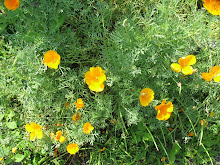Ashland is certainly not the first community to experience this sort of struggle. Town officials see the opportunity for increased revenue from property sales and taxes while residents want to preserve open spaces and prevent sprawl. However, I believe that in most cases, and especially during these economic times, establishing a community garden on vacant property is a wise option if the interest is there, as there appears to be in this town.
I'd be curious to see how easily new homes would sell in this somewhat depressed real estate climate, when others have been on the market for months. As more people are interested in growing vegetables to save money, wouldn't a garden make more sense? Some people may have large yards and can dig up their own property, but others may not have room or enough sun for a plot of their own. Schools and other organizations can use the site and offer educational activities around gardening. Space near the gardens could also be provided for barbecues, concerts, harvest festivals, and other activities that could bring the community together. This may sound a little biased coming from an urban dweller such as myself, but I think involvement in a community garden can lesson the isolation that can come with living in a suburb. Concord, Lexington, and Beverly are just a few of the towns outside of Boston that have established them.
The activists in Ashland haven't given up. They are holding a forum next month to discuss their goals and build momentum. I hope to update you on their progress and explore how community gardens get off the ground in some of my future posts.


4 comments:
Community gardens have been around for 20 or 30 years other places.
Our community is behind the times which makes it a wonderful place to live in some ways.
I was recruited to be part of a nutrition and wellness group that wants to stimulate interest in community gardens.
Ashland is pretty upscale compared to our town. The land and property taxes are probably seen as valuable. Not so much here.
Here, wellness, community pride, and working together are the values the committee is trying to promote through community gardens.
Wish us luck!
In Southern Ontario we have a 'green belt' to control development. The idea is to stop sprawl into the country side, protecting key enviromental areas and farmland. It seems to be working well but of course there is always the complainers.
One problem with this program is it would make it even more difficult for community gardens as they are infilling as much as possible.
The real sad part is sprawl is happening in North America because of the desire for more space. People may not want that master bath or walk in closet when there is no quality farmland left to feed them.
Martha, good luck with your group's goals! I hope your community's efforts to start a community garden bear fruit.
Dan, I'm still a novice at this development stuff--what is "infilling?" It sounds like something that might have some adverse effect on the land as it is.
Infilling is when they use previously used land within the city to develop as appose to using undeveloped land on the outskirts of the city. So they would use vacant land, abandoned buildings etc which could have other wised been used for parks or community gardens. Basically making the city denser so it does not sprawl outside of its boundaries.
Post a Comment